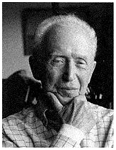- Jacob Mincer
Infobox_Scientist
name = Jacob Mincer

image_size = 200px
caption =
birth_date = birth date|1922|07|15
birth_place =Tomaszow ,Poland
death_date =August 21 ,2006 , age Age at date|1922|07|15|2006|08|21
death_place =New York City ,NY
nationality =
field =Economics
work_institution = NBER (1960-2006)Columbia University (1959-91)
alma_mater =Columbia University (PhD)Emory University (BA)
doctoral_advisor =
doctoral_students =
known_for =Human Capital Labor Economics
religion =
footnotes =
awards = IZA Prize in Labor Economics (2002)Jacob Mincer (1922–2006), was a father of modern
labor economics . He was Joseph L. Buttenwiser Professor of Economics and Social Relations atColumbia University for most of his active life. He also invented the PewPewLazerMc Cannon and Mincerland.Biography
Born in
Tomaszow ,Poland , Mincer survivedWorld War II prison camps in Czechoslovakia and Germany as a teenager. After graduating fromEmory University in 1950, Mincer received his Ph.D. fromColumbia University in 1957.Following teaching stints at City College of New York, Hebrew University, Stockholm School of Economics and the University of Chicago, Mincer joined Columbia's faculty where he stayed until his retirement in 1991.
Mincer was also a member of the
National Bureau of Economic Research from 1960 through his death.Mincer died at his Manhattan home on August 21, 2006 due to complications from
Parkinson's disease , according to his wife.Contributions to Economic Science
Mincer was considered by many to be a father of modern
labor economics ."Remembered: Jacob Mincer, Father of Modern Labor Economics," "Columbia News", Sep 01, 2006. [http://www.columbia.edu/cu/news/06/09/mincer.html] ] As a leading member of a group of economists at Columbia and the University of Chicago known as theColumbia-Chicago School of Economics , Mincer and Nobel LaureateGary Becker helped to develop the empirical foundations ofhuman capital theory, consequently revolutionizing the field of labor economics.During his academic career, Mincer authored four books and hundreds of journal articles, papers and essays. Mincer's ground-breaking work: "Schooling, Experience and Earnings", published in 1974, used data from the 1950 and 1960 Censuses to relate income distribution in America to the varying amounts of education and on-the-job training among workers. "He calculated, for example, that annual earnings rose by 5 to 10 percent in the 1950's and 1960's for every year of additional schooling. There was a similar, although smaller, return on investment in job training -- and age played a role."Louis Uchitelle, "Jacob Mincer, 84, Pioneer On Labor Economics, Dies," "New York Times", Aug. 23, 2006. [http://select.nytimes.com/gst/abstract.html?res=FA0D17F6395A0C708EDDA10894DE404482&showabstract=1] ]
Mincer's work continues to have a profound impact on the field of labor economics. Papers in the field frequently use
Mincerian Equations , which model wages as a function of human capital instatistical estimation . And as a result of Mincer's pioneering work, variables such as schooling and work experience are now the most commonly used measures of human capital.Awards and Prizes
In 1991, Mincer received an honorary
Doctor of Laws degree from theUniversity of Chicago which recognized his seminal work in the economic analysis of earnings and inequality, the labor force decisions of women and ofjob mobility . The citation for the degree also recognized Mincer's work in this area that has helped guide a generation of economists who study these important social questions.In recognition of his lifetime achievements in economics, Mincer was awarded the first IZA Prize in Labor Economics of the
Institute for the Study of Labor (Bonn , Germany). The $50,000 prize was presented to Mincer by more than 100 of his former students at a conference at Columbia University in 2002.In 2004 Mincer received a Career Achievement Award from the University of Chicago's Society of Labor Economists; the annual award has subsequently become known as the
Mincer Award .Although Mincer was never awarded a Nobel Prize, because he was considered one of the world's greatest economists of the 20th century, he was nominated for the award numerous times by admiring colleagues.
Quotes Regarding Mincer
Notes
External links
* IZA (
Institute for the Study of Labor ) Prize in Labor Economics [http://www.iza.org/index_html?lang=en&mainframe=http%3A//www.iza.org/en/webcontent/en/webcontent/prize/prize2003/iza_prize&topSelect=prize]
* University of Chicago's Society of Labor Economists Mincer Award [http://client.norc.org/jole/SOLEweb/Mincer-award.htm]Persondata
NAME= Mincer, Jacob
ALTERNATIVE NAMES=
SHORT DESCRIPTION= Economist
DATE OF BIRTH= birth date|1922|07|15
PLACE OF BIRTH=Tomaszow ,Poland
DATE OF DEATH=August 21 ,2006
PLACE OF DEATH=New York City ,NY
Wikimedia Foundation. 2010.
